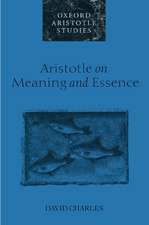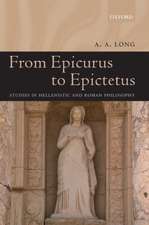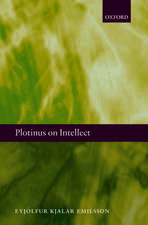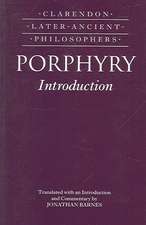The Poetics of Phantasia: Imagination in Ancient Aesthetics
Autor Anne Shepparden Limba Engleză Paperback – 23 sep 2015
| Toate formatele și edițiile | Preț | Express |
|---|---|---|
| Paperback (1) | 254.28 lei 6-8 săpt. | |
| Bloomsbury Publishing – 23 sep 2015 | 254.28 lei 6-8 săpt. | |
| Hardback (1) | 770.94 lei 6-8 săpt. | |
| Bloomsbury Publishing – 12 mar 2014 | 770.94 lei 6-8 săpt. |
Preț: 254.28 lei
Preț vechi: 293.71 lei
-13% Nou
Puncte Express: 381
Preț estimativ în valută:
48.66€ • 50.50$ • 40.67£
48.66€ • 50.50$ • 40.67£
Carte tipărită la comandă
Livrare economică 15-29 martie
Preluare comenzi: 021 569.72.76
Specificații
ISBN-13: 9781474257596
ISBN-10: 1474257593
Pagini: 136
Dimensiuni: 156 x 234 x 7 mm
Greutate: 0.2 kg
Editura: Bloomsbury Publishing
Colecția Bloomsbury Academic
Locul publicării:London, United Kingdom
ISBN-10: 1474257593
Pagini: 136
Dimensiuni: 156 x 234 x 7 mm
Greutate: 0.2 kg
Editura: Bloomsbury Publishing
Colecția Bloomsbury Academic
Locul publicării:London, United Kingdom
Caracteristici
Engages with a wide range of ancient Greek texts, from Homer to Neoplatonist philosophers
Notă biografică
Anne Sheppard is Professor of Ancient Philosophy, Royal Holloway, University of London, UK. Her publications include Studies on the 5th and 6th essays of Proclus' Commentary on the Republic (Hypomnemata 61. Göttingen 1980); Aesthetics. An introduction to the philosophy of art (Oxford 1987) and Greek and Roman Aesthetics (Cambridge Texts in the History of Philosophy. Cambridge 2010). Her co-edited works include Ancient Approaches to Plato's Timaeus (London 2003), Studies on Porphyry (London 2007), Aristotle and the Stoics reading Plato (London 2010) and Ancient Approaches to Plato's Republic (forthcoming, London 2013).
Cuprins
PrefaceIntroduction: Aristotle's phantasia and the ancient concept of imaginationTimelineChapter 1: Visualization, vividness (enargeia) and realismChapter 2: Mathematical projection, copying and analogyChapter 3: Prophecy, inspiration and allegoryConclusion: Ancient and modern imaginationBibliographyIndex
Recenzii
This elegant, slim volume contributes to the vast literature on phantasia and imagination in Greek thought ... [It] is a rewarding study that should be widely consulted.
This work is highly commendable. It accompanies the reader through an intricate web of sometimes difficult or ambiguous philosophical formulations. It successfully engages with the polysemy of the key terms examined, constantly recapitulating the essential notions to be kept in mind before moving on to the next argument, in simple language and a straightforward style. All in all, this is a very enjoyable account of the Neoplatonic reception, and conflation, of Platonic and Aristotelian statements about the place of imagination in metaphysics . I wish to conclude by stressing the quality of this book as clear and synthetic account of how the Neoplatonic school viewed the limits and powers of the imaginative faculty of the human soul.
Rich and elegant ... Sheppard's new book will provide the reader with stimulating insights and comments on a variety of ancient texts from different periods, and will encourage further discussion on the ancient concept of imagination and its aesthetic significance.
[Sheppard] tackles a difficult subject with admirable clarity. It is erudite but the many references do not impede the flow of the argument ... The discussion is impressively wide-ranging, embracing more recent theorists of the imagination such as Kant and Auerbach. Although written from a philosopher's perspective, the book carries a message that will resonate with a much wider audience.
The strongest reward of The Poetics of Phantasia for most scholars of thinking rhetoric is phantasia outside of a chronological framework and from a perspective indebted strongly to Plato as well as Aristotle.
This work is highly commendable. It accompanies the reader through an intricate web of sometimes difficult or ambiguous philosophical formulations. It successfully engages with the polysemy of the key terms examined, constantly recapitulating the essential notions to be kept in mind before moving on to the next argument, in simple language and a straightforward style. All in all, this is a very enjoyable account of the Neoplatonic reception, and conflation, of Platonic and Aristotelian statements about the place of imagination in metaphysics . I wish to conclude by stressing the quality of this book as clear and synthetic account of how the Neoplatonic school viewed the limits and powers of the imaginative faculty of the human soul.
Rich and elegant ... Sheppard's new book will provide the reader with stimulating insights and comments on a variety of ancient texts from different periods, and will encourage further discussion on the ancient concept of imagination and its aesthetic significance.
[Sheppard] tackles a difficult subject with admirable clarity. It is erudite but the many references do not impede the flow of the argument ... The discussion is impressively wide-ranging, embracing more recent theorists of the imagination such as Kant and Auerbach. Although written from a philosopher's perspective, the book carries a message that will resonate with a much wider audience.
The strongest reward of The Poetics of Phantasia for most scholars of thinking rhetoric is phantasia outside of a chronological framework and from a perspective indebted strongly to Plato as well as Aristotle.



















